More Than Just Pizza and Dodgeball
Christian youth group events are far more than a way to fill a Wednesday night—they’re strategic moments where teens meet Jesus, build friendships, and find their purpose in God’s kingdom. The most effective gatherings consistently hit three targets:
- Up-reach (Worship) – creating space for authentic encounters with God
- In-reach (Fellowship & Discipleship) – growing deep, supportive community
- Out-reach (Evangelism & Service) – equipping students to share and serve
Every game, discussion, and activity should point teens toward Christ and foster relationships that last beyond graduation. At Momentum Ministry Partners we’ve watched thousands of students take next steps of faith because leaders planned with this intentionality. When fun is purpose-filled and prayer-soaked, God shows up in life-changing ways.
I’m Jeff Bogue. After three decades in ministry leadership with Momentum and Grace Church, I’ve learned that unforgettable christian youth group events balance high-energy fun with clear opportunities for spiritual growth. Let’s dive into practical ideas you can start using this month.
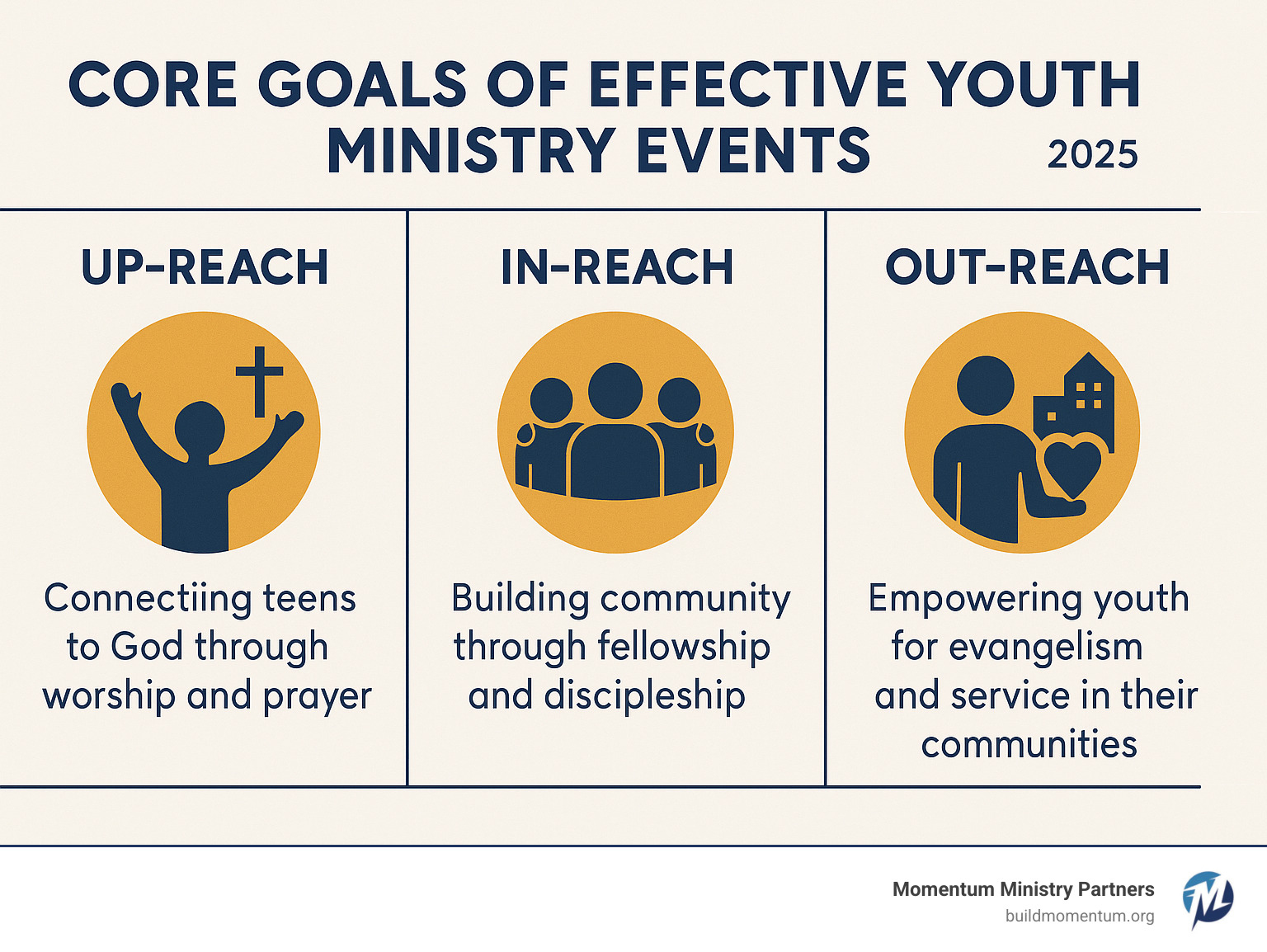
Icebreakers and Community-Building Games
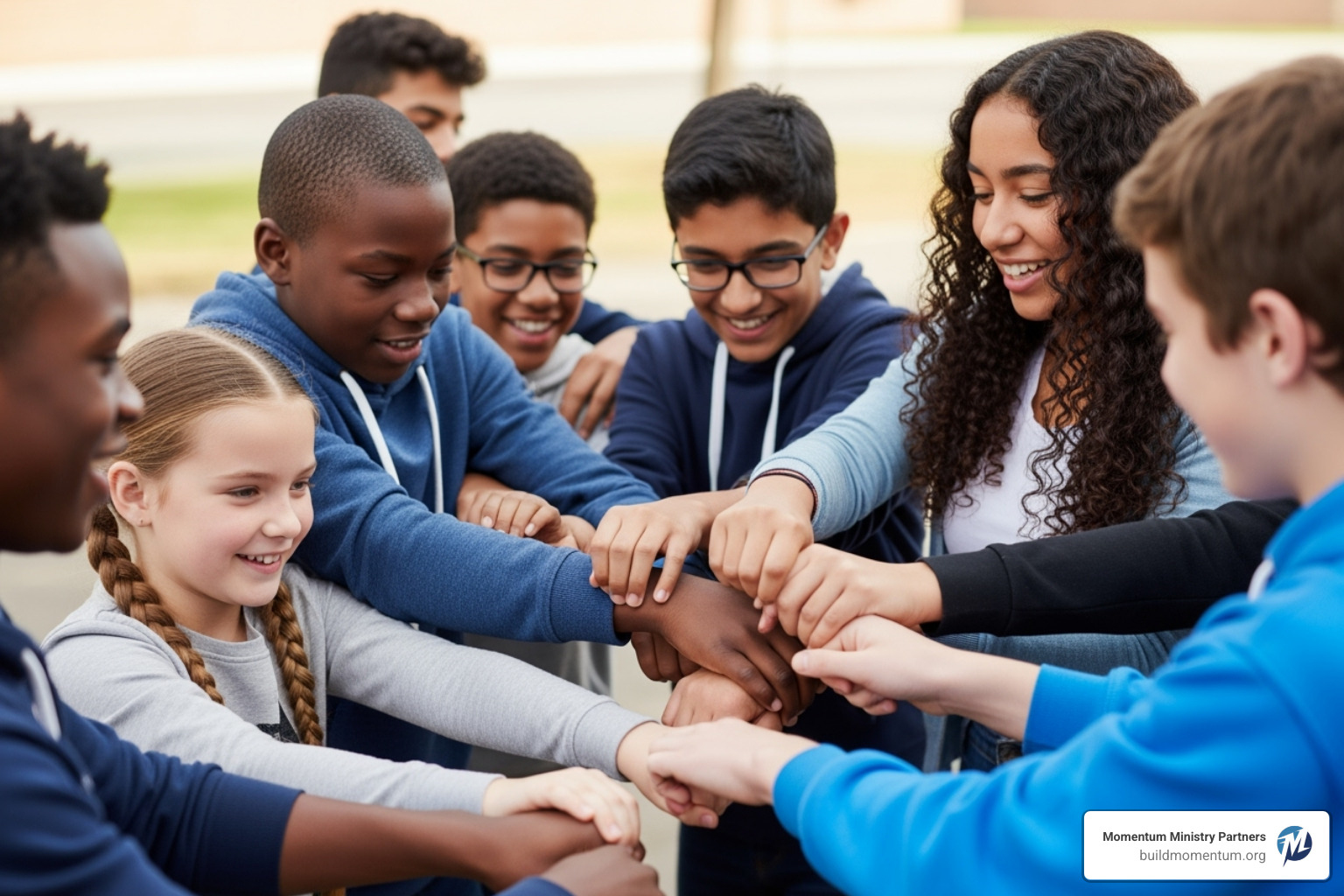
Every youth leader knows that feeling – watching teens walk into your event and immediately gravitate toward their usual friend groups, leaving newcomers standing awkwardly by themselves. This is exactly why christian youth group events need intentional community-building activities that break down those invisible barriers and help every student feel included.
The magic happens when you create activities that require teens to interact with people outside their comfort zones. Take the Human Knot game, for example. When students grab hands randomly and work together to untangle themselves without letting go, something beautiful occurs. They’re laughing, problem-solving, and depending on each other – often with kids they barely knew five minutes earlier.
Rock, Paper, Scissors Champion is another crowd favorite that gets everyone involved immediately. Start with pairs playing the classic game, but here’s the twist – winners find new partners while losers become their “biggest fans,” cheering them on to victory. Soon you have one champion with the entire group cheering wildly. It’s hilarious watching the shy kid suddenly become someone’s enthusiastic cheerleader.
All Hands on Deck brings out the teamwork in creative ways. Call out scenarios like “storm approaching” or “pirates on the horizon” and watch teens work together to respond appropriately. The beauty is seeing natural leaders emerge while quieter students find their own ways to contribute.
Don’t overlook the power of Two Truths and a Lie either. When the star athlete reveals they’re secretly terrified of butterflies, or the quiet girl shares she once met a celebrity, these moments create genuine connections that extend far beyond your event.
The key is choosing activities that draw out participation from everyone, not just the extroverts. We’ve learned that when quieter students feel valued from the very beginning, they’re much more likely to engage throughout the entire gathering.
Play With Purpose: Meaningful Youth Group Games for Building Community
Low-Prep Indoor Activities
Sometimes the most impactful christian youth group events happen when you have almost no time to prepare. Weather cancels your outdoor plans, or you’re juggling multiple responsibilities and need something simple yet effective. These low-prep activities prove that meaningful connection doesn’t require elaborate planning.
Board Game Bonanza transforms your space into connection central. Set up stations with different games – Apples to Apples for the laughers, Uno for the competitive spirits, even classic Monopoly for those who love strategy. The real magic isn’t in the games themselves, but in watching teens put down their phones and actually look at each other while they play.
Movie & Discussion Night works especially well when you choose films with substance. Show something like “The Case for Christ” or another faith-based movie, then follow up with guided discussion questions. The combination of visual storytelling and group conversation helps teens process complex faith concepts in ways that stick long after the credits roll.
Bible Charades or Pictionary turns scripture into entertainment gold. Write Bible stories, characters, or verses on slips of paper and watch teams act them out or draw them. You’ll be amazed how well teens remember David and Goliath when they’ve watched their friend dramatically slay an imaginary giant, or how Moses parting the Red Sea becomes unforgettable when someone’s terrible drawing makes everyone laugh.
Costume Relay brings out everyone’s silly side. Set up relay races where teams must put on ridiculous costumes, complete a simple task, then pass the costume to the next person. Think oversized sunglasses, feather boas, and funny hats – the more ridiculous, the better the memories.
YouTube Clip Discussion can spark incredible conversations when you choose the right content. Show short, thought-provoking videos from Christian speakers or powerful testimonies, then break into small groups for discussion. This approach works especially well because it gives quieter students time to process before sharing.
The beauty of these activities is their simplicity. As one youth leader recently told us, “Sometimes our best nights are the ones where we just played games and talked.” There’s profound truth in that – authentic relationships often grow in the simplest moments.
Learn how to get your youth group talking
Activities for Spiritual Growth and Worship

The heart of any christian youth group event beats strongest when we create genuine space for teens to encounter God personally. After three decades in ministry, I’ve learned that the most transformative moments happen when we stop trying so hard to manufacture spiritual experiences and simply invite the Holy Spirit to work.
Here’s what I’ve found: teens crave authentic spiritual connection, but they can spot fake spirituality from a mile away. The activities that truly impact young hearts are age-appropriate, interactive, and leave plenty of room for personal reflection. Research consistently shows that this generation learns best through participation rather than passive listening, which explains why traditional lecture-style teaching often misses the mark.
One-Verse Bible Study has become one of our most powerful tools. Instead of rushing through multiple passages, we choose a single verse and spend 15-20 minutes exploring it deeply. Teens read it in different translations, discuss what it meant to the original audience, and share how it applies to their lives today. This focused approach helps them dig deeper rather than skimming the surface.
Prayer circles work beautifully when we form small groups of 4-5 teens with specific prayer prompts. We start with easier topics like thanking God for good things, then gradually move toward more personal requests. Many teens have never prayed out loud before, so creating that safe, supportive environment is absolutely crucial.
Testimony sharing becomes powerful when we invite teens to share how they’ve seen God working in their lives, even in small ways. The key is structuring this carefully with time limits and clear guidelines to keep it focused and encouraging rather than overwhelming.
Worship through creative expression recognizes that teens connect with God in various ways. We set up stations where they can worship through different artistic mediums: journaling, drawing, music, or poetry. This gives introverts alternative ways to participate while honoring different learning styles.
The secret sauce is balancing structure with flexibility. We provide enough guidance to keep things focused while leaving room for the Holy Spirit to move in unexpected ways.
Integrating Faith into Every Event
The most effective christian youth group events seamlessly weave spiritual truth throughout the entire experience rather than awkwardly tacking on a devotional at the end. This integration requires intentional planning, but it creates much more natural opportunities for spiritual growth.
Connecting games to scripture transforms ordinary activities into powerful teaching moments. After playing a trust-building game, we discuss how trust relates to faith in God. Following a teamwork activity, we explore how the body of Christ works together. These connections help teens see biblical principles in action rather than just hearing about them in theory.
Using devotionals strategically means choosing short, focused messages that connect directly to the evening’s activities. Research shows that teens retain information better when it’s presented in smaller chunks with immediate application opportunities. Nobody wants to sit through a lengthy sermon after an evening of high-energy activities.
Small group discussions break larger groups into smaller circles of 6-8 teens with trained adult leaders. This creates safer spaces for vulnerable sharing and ensures quieter students have opportunities to participate. Some of the most meaningful conversations happen in these intimate settings where teens feel truly heard.
Accountability partners work especially well when we pair teens with someone they can check in with regularly about their spiritual growth. We give them specific questions to discuss and regular opportunities to connect during events. This builds the kind of authentic relationships that sustain faith beyond youth group.
The role of youth leaders in modeling faith cannot be overstated. The adults in the room set the tone for spiritual openness. When leaders authentically share their own struggles and victories, teens feel permission to be real about their faith journey too. As one teen told us, “I like that we talk about God stuff, but it doesn’t feel fake or weird.”
Worship and Prayer Focused Events
Some of the most powerful christian youth group events center entirely around worship and prayer. These experiences create sacred space where teens can encounter God’s presence in profound ways that they’ll remember for years.
Acoustic Worship & Bonfire Night brings teens together around a fire pit with acoustic guitars and simple worship songs. The intimate setting encourages participation from teens who might feel intimidated in larger worship settings. We always include time for silent reflection and spontaneous prayer requests. There’s something about firelight that makes hearts more open to God’s voice.
Prayer Walk through the community takes teens on a walking tour of your neighborhood, stopping to pray for specific locations: schools, businesses, homes, parks. This helps them see their community through God’s eyes and develops a heart for local mission. We often provide blessing bags to distribute to homeless individuals we might encounter along the way.
One-Verse Bible Study combined with prayer creates deep spiritual moments. We choose a verse that speaks to current teen struggles, spend time understanding it together, then pray specifically about how God wants to apply it in their lives.
“Woolen Heart” activity involves giving each teen a piece of wool or fabric to hold while sharing something heavy on their heart. As they share, they can squeeze the wool, representing giving that burden to God. It’s a tangible way to practice casting their cares on Him.
Trust and prayer activities build both community and faith simultaneously. Simple exercises like prayer partners or guided meditation help teens learn to listen for God’s voice in the quiet moments.
Quick Prayer Meetings can happen spontaneously when someone shares a need or celebration. These unplanned moments often become the most meaningful parts of an evening, showing teens that God cares about their immediate concerns.
The key with worship-focused events is careful preparation combined with skilled facilitation. These experiences require adults who can read the room, guide without controlling, and create space for the Holy Spirit to work. When done well, they become the experiences teens remember most vividly years later.
Service Projects and Community Outreach

There’s something beautiful that happens when teens roll up their sleeves and serve others. Christian youth group events centered around service projects move young people beyond themselves and into God’s heart for the world. These experiences transform faith from something abstract into something tangible and real.
I’ve watched countless teens find their purpose through service. A shy sophomore finds her voice while reading to nursing home residents. A tough guy tears up while serving meals at a homeless shelter. A group of athletes realizes their strength can be used to help elderly neighbors with yard work. These moments change everything.
The research backs up what we see in practice – teens who participate in service projects develop stronger faith, better leadership skills, and deeper connections to their church community. But more importantly, they begin to understand that following Jesus means caring for others, especially those who are vulnerable or marginalized.
Matthew 25:40 comes alive during these experiences: “Whatever you did for one of the least of these brothers and sisters of mine, you did for me.” When teens serve meals at a homeless shelter or visit elderly residents in nursing homes, they’re not just helping people – they’re encountering Jesus himself.
The most effective service projects meet real community needs rather than creating busy work. They’re age-appropriate and safe for teenage participants, but they also challenge teens to step outside their comfort zones. The key is including reflection time afterward to process the experience spiritually and connect it to broader biblical themes about justice and compassion.
We’ve found that service projects often become the most transformative christian youth group events because they move teens beyond themselves and into God’s heart for the world. These experiences create opportunities for teens to interact with people different from themselves, fostering empathy and understanding that lasts long after the project ends.
Learn more about Christian Mission Trips
Serving Your Local Community
The most powerful service opportunities are often right in your own backyard. Local service projects allow teens to see their community through God’s eyes while building relationships that can lead to ongoing ministry partnerships.
Rake and Run has become one of our favorite fall activities. Get a list of elderly church members or community residents who need yard work assistance, then show up with rakes, leaf bags, and servant hearts. The “run” part means you don’t accept payment or stay for lengthy conversations – just serve and go. This teaches teens that service is its own reward and that sometimes the most Christ-like thing we can do is help without expecting anything in return.
Visit a Nursing Home creates some of the most meaningful connections you’ll ever witness. Coordinate with local nursing facilities to bring joy to residents through games, music, or simple conversation. Prepare teens with conversation starters and help them understand that their presence is often the greatest gift they can offer. Many facilities welcome regular visits that become anticipated highlights for residents who rarely see family.
Food Pantry Scavenger Hunt turns grocery shopping into a game while meeting real needs. Give teams lists of needed items and send them to different stores with a budget to work within. The competitive element makes it fun while the purpose keeps it meaningful. Include a brief devotional about Jesus feeding the 5,000 to connect the activity to biblical truth.
Clean Up a Local Park provides visible results that create a sense of accomplishment. Partner with city officials to adopt a park or clean up a neglected area. Bring work gloves, trash bags, and painting supplies if needed. The change is immediate and serves the broader community while teaching teens to be good stewards of God’s creation.
Teacher Appreciation Events serve an often-overlooked group while teaching teens to honor those in authority. Organize a special worship service or appreciation dinner for local teachers. Include testimonies from teens about teachers who have made a difference in their lives. This creates positive connections between your church and the school community.
Neighborhood Work Parties identify families in your community who need help with home maintenance, yard work, or moving assistance. Make it clear that this service is free and motivated by Christian love. Wear matching church shirts to create positive visibility for your congregation and natural opportunities for conversations about faith.
These local service opportunities help teens develop a heart for their community while providing natural opportunities to share their faith through both actions and words.
Planning Successful Christian Youth Group Events
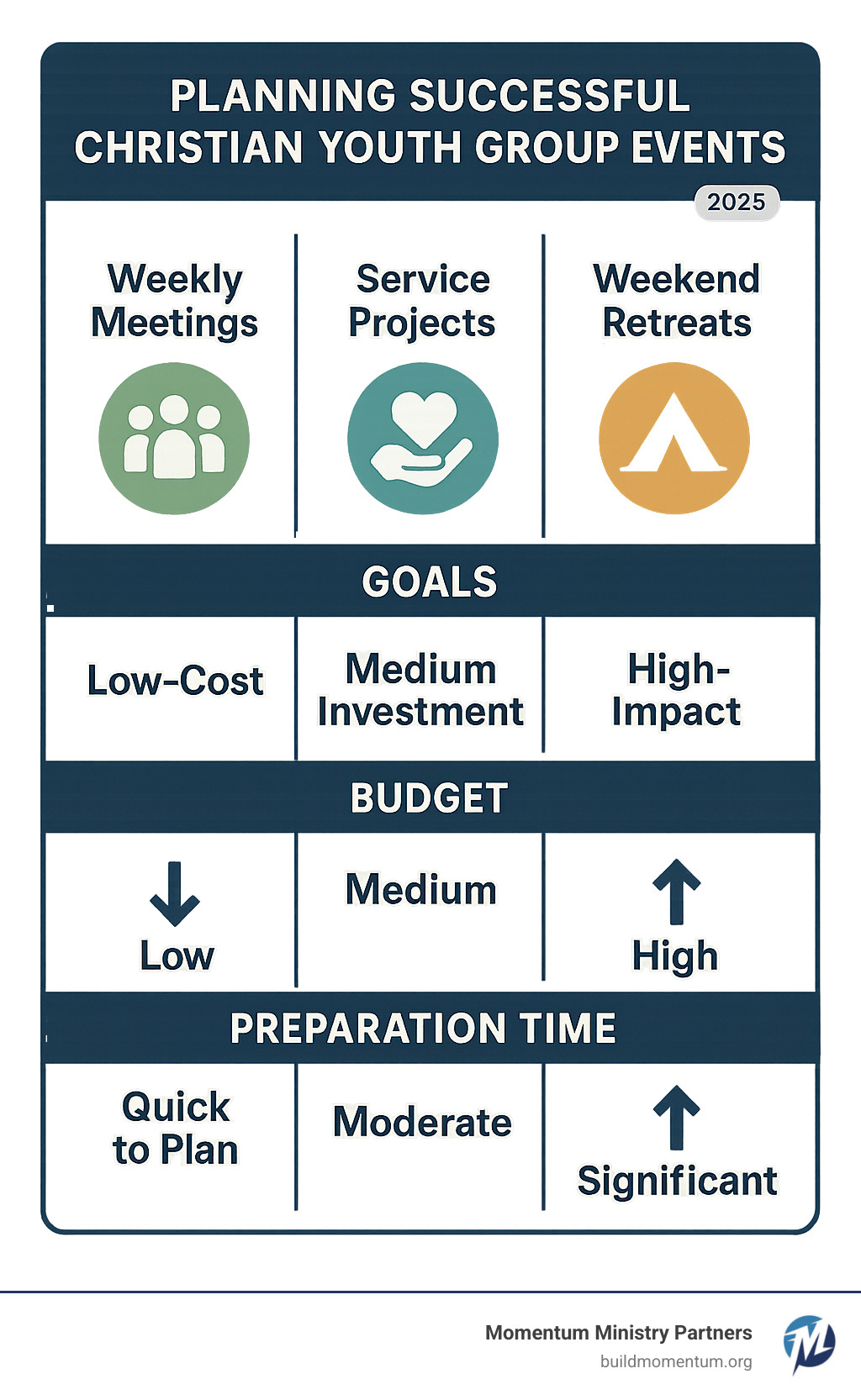
Behind every transformative christian youth group event is a leader who understood that great ministry doesn’t happen by accident. After three decades in youth ministry, I’ve learned that the events teens remember years later – the ones that truly change lives – are built on a foundation of intentional planning and prayerful preparation.
The most common mistake I see youth leaders make is jumping straight into activity planning without first establishing clear goals and practical frameworks. It’s tempting to focus on the fun stuff, but successful christian youth group events require careful attention to safety protocols, volunteer management, and budget considerations.
Your planning approach should vary based on your specific context. A weekly meeting for twelve middle schoolers needs different strategies than a weekend retreat for fifty high schoolers. The key is understanding your group’s unique needs while following proven planning principles that work across different settings.
Safety and accountability form the non-negotiable foundation of every event. This means establishing clear adult supervision ratios, creating emergency action plans, and ensuring proper transportation arrangements. Parents trust us with their most precious gifts – we must honor that trust through excellent preparation.
Budget management doesn’t mean cutting corners on impact. Some of our most powerful events have cost almost nothing because we focused on relationships and spiritual growth rather than expensive activities. The goal is maximizing kingdom impact within your financial resources.
Volunteer recruitment and training often determines whether your event succeeds or struggles. Look for adults who genuinely enjoy teenagers and share your ministry vision. Provide them with clear expectations, practical training, and ongoing support throughout the planning process.
The Blueprint for a Great Event
Every christian youth group event that creates lasting impact follows a similar blueprint. This framework has been tested in churches nationwide and consistently produces both spiritual growth and practical success.
Vision and mission clarity must come first. Before you plan a single activity, define what you want to accomplish. Are you primarily focused on evangelism, discipleship, fellowship, or service? Your purpose should align with your church’s overall mission and guide every planning decision you make.
SMART goal setting transforms vague hopes into measurable outcomes. Instead of wanting teens to “have a good time,” aim for something like “helping fifteen students develop deeper friendships through team-building activities and guided small group discussions.” This specificity shapes everything from activity selection to volunteer assignments.
Calendar creation works best when you plan backward from your event date. Include deadlines for promotion, registration, supply purchasing, volunteer recruitment, and final preparations. This systematic approach prevents the last-minute scrambling that creates stress for leaders and subpar experiences for teens.
Program structure requires balancing high-energy activities with quieter moments for spiritual reflection. Build in buffer time between activities and always have backup plans ready for weather complications or other unexpected challenges. The best events feel spontaneous to participants but are actually carefully orchestrated behind the scenes.
Strategic promotion uses multiple communication channels to build genuine excitement. Start with social media posts that capture your event’s energy, but don’t neglect personal invitations and parent communications. Visual materials that clearly communicate both the fun and spiritual purpose of your gathering tend to generate the strongest response.
Feedback gathering should happen within a week of your event while experiences are still fresh. Ask participants about both enjoyment and spiritual impact. Use their responses to refine your approach for future events and identify volunteers who might take on greater leadership roles.
Success celebration acknowledges the hard work of volunteers while sharing positive outcomes with church leadership. When you tell stories of spiritual growth and community building, you build support for future youth ministry initiatives and inspire others to get involved.
This systematic approach ensures your christian youth group events accomplish their intended purposes while creating positive experiences that teens eagerly anticipate. We’re not just planning activities – we’re creating opportunities for life change through the power of Jesus Christ.
Frequently Asked Questions about Christian Youth Group Events
How do you make a youth group event fun and meaningful?
Great christian youth group events don’t separate “fun time” from “God time.” Start with an engaging icebreaker, move into the main activity, then always debrief—linking what you just did to a clear biblical principle. For example, after a trust game discuss Proverbs 3:5-6. This seamless integration keeps the night authentic and memorable.
How can we get more students to come?
Consistency and personal connection are key. Publish a calendar families can plan around, and empower your current students to invite friends. Address common barriers by offering rides, keeping costs low, and making newcomers feel seen the moment they walk in. Remember: a handful of excited teens will draw others faster than any advertising campaign.
According to a recent Pew Research Center study, teenagers who experience meaningful faith community are far more likely to stay engaged with church as adults. Quality counts—focus on depth, not just headcount.
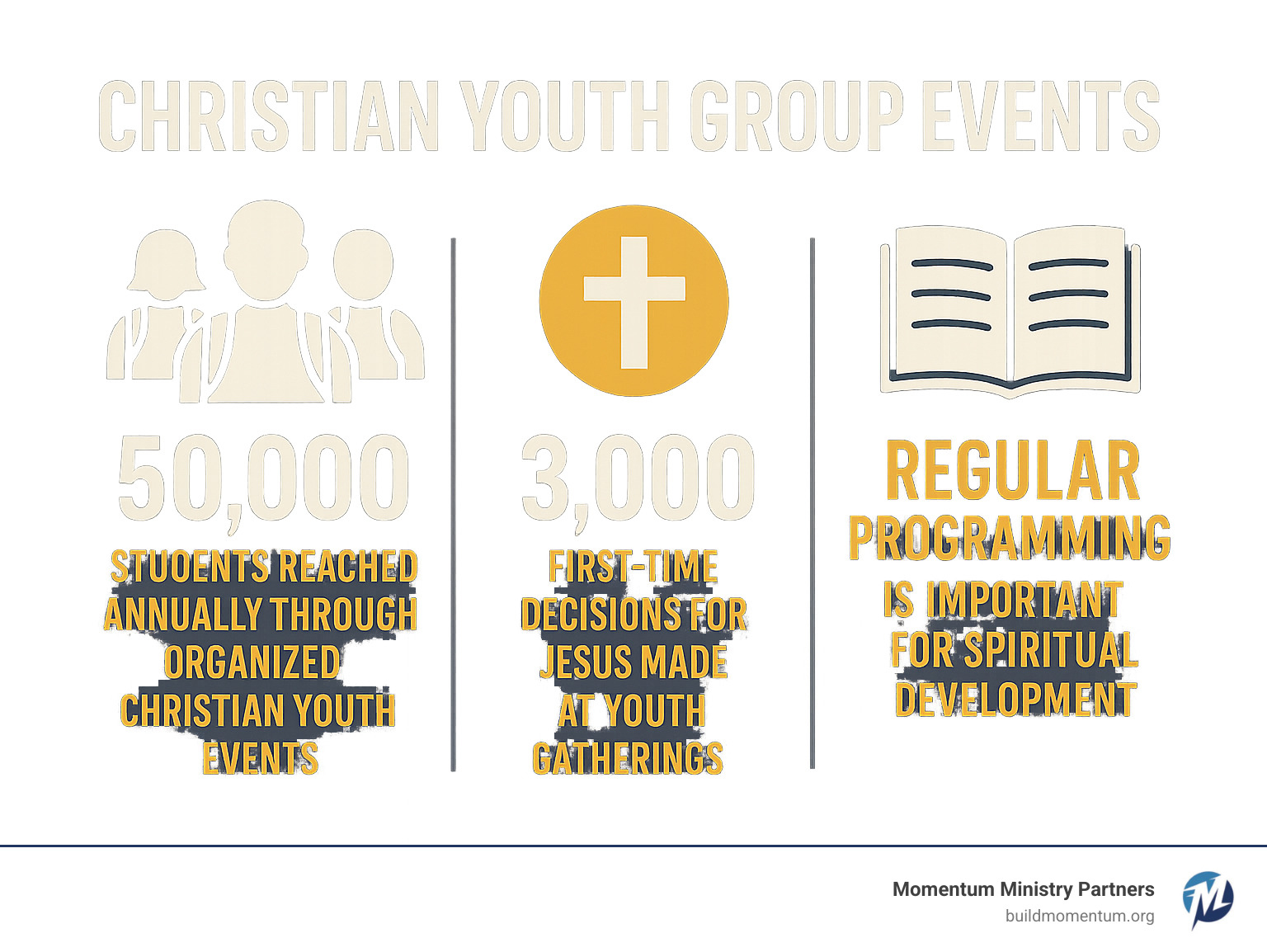
Conclusion: Creating Events with Eternal Impact
When you plan christian youth group events with purpose and prayer, you’re doing far more than filling a Wednesday night calendar. You’re creating sacred moments where young hearts encounter Jesus, where lasting friendships are forged, and where the next generation of church leaders finds their calling.
I’ve witnessed this change countless times over three decades of ministry. A shy teenager finds their voice during a service project. A struggling student experiences God’s love through the authentic care of their small group. A natural leader emerges during a community outreach event. These aren’t just nice memories – they’re life-changing experiences that shape eternity.
The research backs up what we see in our churches. Teens who participate in meaningful youth programming are significantly more likely to maintain their faith through college, become active in adult congregations, and raise their own children in the church. When we invest in quality christian youth group events, we’re literally building the future of the church.
But here’s what I’ve learned matters most: it’s not about having the perfect program or the biggest budget. The most transformative events happen when caring adults create safe spaces for teens to encounter God authentically. When young people see real faith lived out by their leaders, they’re inspired to pursue their own relationship with Jesus.
At Momentum Ministry Partners, we’ve partnered with churches across the country to create these kinds of impactful youth experiences. We’ve seen entire congregations energized when their teens are engaged and growing. There’s something contagious about young people who are excited about their faith – it spreads throughout the whole church community.
As you implement these ideas in your own ministry context, every game, every service project, and every moment of fellowship is an opportunity to point young people toward Jesus. Whether you’re planning a simple pizza night or an elaborate retreat, approach it with the understanding that God can use any experience to change a life.
The harvest truly is plentiful, and the next generation is waiting. Through thoughtful planning, faithful execution, and dependence on God’s Spirit, your christian youth group events can become catalysts for change that echo into eternity.
Partner with us to create life-changing youth conference experiences
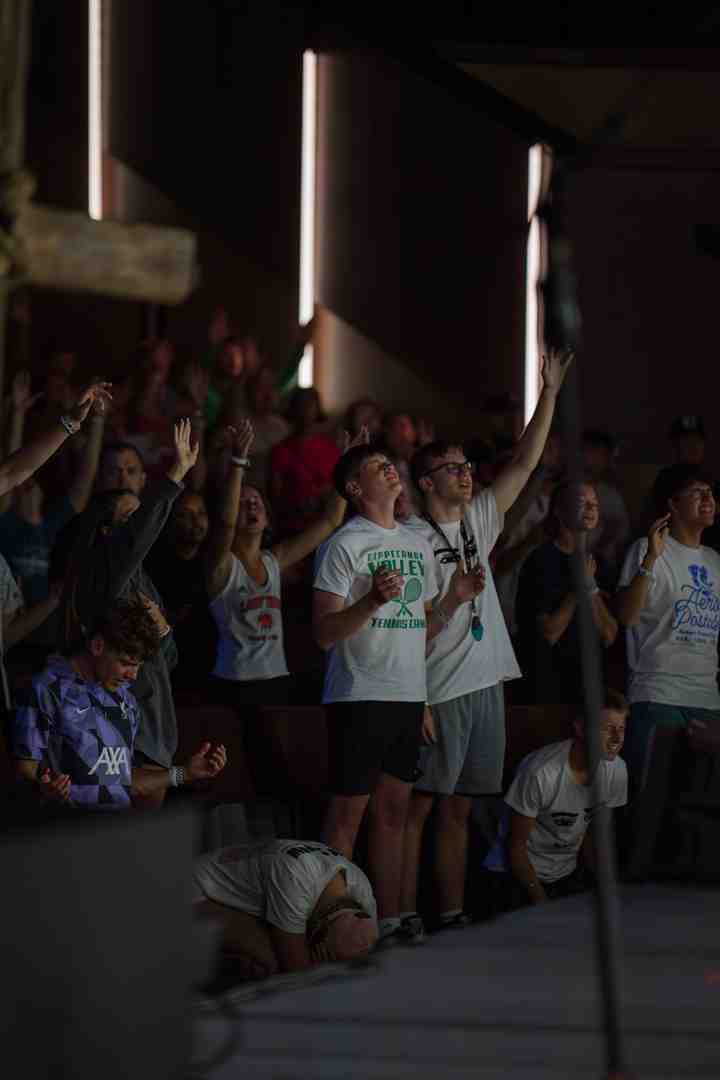






0 Comments